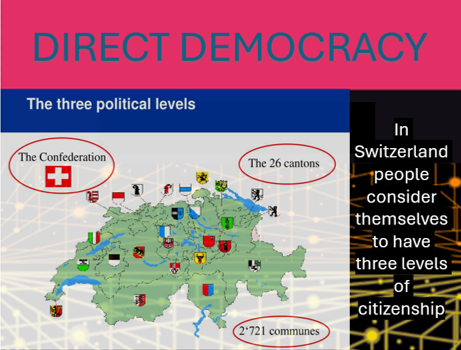"Roots of Democracy: Exploring the Unique Power of Subsidiarity in Switzerland’s Political System"
- 5thavenueartist
- Jan 13, 2025
- 2 min read
Subsidiarity is a principle central to the Swiss political system, highlighting the value of governance at the most local level possible. It ensures decisions are made closest to the people they affect, fostering both empowerment and accountability.
A simple illustration
To understand its significance, consider a tree: the roots represent the local communities, which directly nurture the trunk (cantons) and ultimately support the branches and leaves (the federal government). Without strong, healthy roots, the entire tree would falter. Similarly, subsidiarity underpins democracy by strengthening the connection between citizens and their government.
Distributed Power
Switzerland’s commitment to subsidiarity is reflected in its unique federal system and direct democracy. Over centuries, various alliances of self-governing regions evolved into the cohesive federal state we know today.
Despite this unity, power remains distributed across three levels: the Confederation, 26 cantons, and over 2,000 communes. This multi-tiered structure ensures local autonomy while enabling collaboration on national and international matters.
Shared Power
The Federal Constitution of 1848 laid the foundation for this system, establishing a federal state from a loose confederation. Since then, citizens’ rights have expanded, and the system has matured to accommodate growing political diversity. The Swiss Parliament, made up of two chambers—the National Council (200 members) and the Council of States (46 members)—is directly elected by the people, giving voters a voice at the national level. Political power is shared across parties, with the Federal Council, consisting of seven members from the strongest parties, working collaboratively in a consociational democracy.
Bern, often seen as Switzerland’s capital, is officially referred to as the "federal city." This terminology reflects the Swiss approach: decentralized governance, avoiding excessive concentration of power in any single entity. Instead, the focus is on collaboration and balance.
A truly participatory political system
Swiss democracy is deeply participatory, offering more opportunities for citizen involvement than almost any other country. Approximately 5.5 million eligible voters, 63% of the population, regularly shape the nation’s policies through referendums and elections.
With three to four nationwide votes each year, citizens influence issues directly, embodying the principle of self-determination. In certain cantons, such as Appenzell Innerrhoden and Glarus, the centuries-old tradition of the *Landsgemeinde* (People’s Assembly) continues, where citizens gather to vote publicly by show of hands.
Democracy on steroids
This enduring commitment to subsidiarity ensures a democracy rooted in the freedom and responsibility of its people.
By empowering individuals and local communities to have a meaningful say, Switzerland demonstrates how decentralized governance can cultivate a thriving, resilient democracy.




Comments